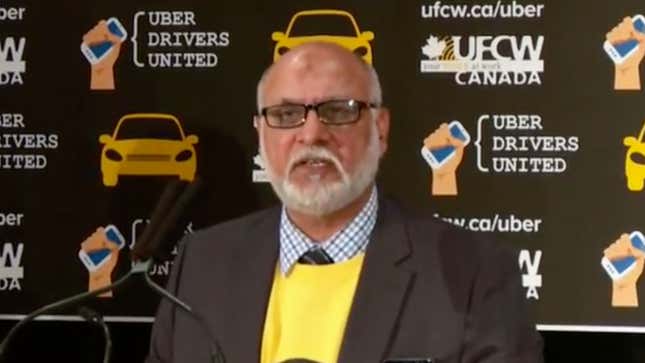
In a growing number of cities where rideshare platforms operate, drivers are fed up with the low pay, long hours, and lack of basic worker protections that shlepping strangers around entails. In the U.S., this has led to large, coordinated protests and attempts to game the system to achieve a living wage. Canadian drivers, however, took a more traditional route: signing union cards.
First announced on Monday, Uber drivers based in Toronto expressed their intention to join the United Food and Commercial Workers, a 250,000-strong trade union which operates in both Canada and the U.S. The actual number of drivers who had signed cards was not released, but during a press conference this afternoon, UFCW Canada staffer Pablo Godoy claimed their support had hit the “high hundreds” and were growing rapidly.
As with grassroots groups like Rideshare Drivers United, the hope is to bring Uber’s work standards into closer parity with that of traditional cabs by upholding the regional minimum wage, sick day, vacation, and break standards, as well as an overhaul of the deactivation system that effectively allows Uber to fire drivers without recourse. “These are human rights, and all drivers deserve this basic level of respect,” Ejaz Butt, a local driver, said today.
What makes Ontario an interesting test bed is that by signing with UFCW, drivers are effectively shooting first and asking questions later—which may end up being the wiser tactic. “Today is the beginning of a process that we’re embarking on. The first step of that process is to call Uber come to the table,” Godoy said, though he readily admits Uber has yet to offer a response. (For whatever it’s worth, Gizmodo also reached out to Uber for comment on Monday and has also not received a reply.) The same business model that allows Uber to consider its drivers independent contractors rather than employees exists in Canada just as it does in the U.S., and Uber is certain to defend its claim vociferously if it’s forced to acknowledge a threat to said claim at all.
At the moment, the UFCW-signed drivers in Canada’s largest city are not certified as a union, and matters may be further complicated by the fact that most rideshare drivers operate on multiple platforms concurrently. “Having multiple employers does not mean that you’re not an employee of the company that you drive or work for,” Godoy stated, but it may still pose representation issues down the line.
Currently, Toronto’s city government is weighing how to balance the interests of rideshare and cab companies—something New York already had a protracted fight over, eventually ruling in favor of drivers. Ultimately, Godoy told the press that “we believe Uber will listen to the concerns.”